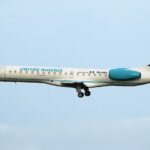According to the website Bloomberg Quint, which combines the expertise of both Bloomberg as well as Indian news website Quintillion, Hong Kong Airport has ceased to be an international aviation hub.
Willie Walsh, Director General of the International Air Transport Association (IATA), has said that Hong Kong is effectively off the map now in terms of being an airport hub. He also added that it will take a long time for the airport to recover from the effects of Covid and that it is seriously lagging behind in terms of the recovery happening elsewhere.
With reference to the website Simple Flying, Hong Kong Airport, before the pandemic in February 2019, handled 5.89 million passengers. In February of this year, however, the airport only handled 86,000 passengers. So what is the reason behind this?

The Reason Behind This
According to Walsh, Hong Kong has been adopting a rather strict approach to Covid. Now the rules are being relaxed; the time that passengers have to isolate for once they come to Hong Kong has been halved to one week. However, Walsh adds that even this period of isolation will deter travellers. It was felt that after the rest of Asia started re-opening and relaxing, the rules Hong Kong would also follow. However, this has not happened.
The restrictions in Hong Kong have been very severe. Even though Hong Kong is relaxing some of the world’s strictest curbs, it still continues to ban certain airlines from coming there. There has been much frustration over the past two years in the city of Hong Kong due to the pandemic restrictions. Walsh adds that the restrictions have led to the cancellation of many services, with airlines finding it very difficult to operate there.
One could argue that people’s health takes priority, and therefore the onus on the city’s government and authorities should be to curtail the spread of Covid. However, the IATA argues that Covid needs to be managed rather than locked out. It warns that if countries continue to lock out the disease rather than manage the condition as it occurs, they will not be able to profit from the economic and consequent societal benefits that will ensue from the restoration of international travel. The IATA represents almost 300 airlines accounting for 83% of global traffic.
Disciplining Airlines
Hong Kong Airport also seems to be disciplining airlines for alleged breaches of their Covid rules. Singapore Airlines, Cathay Pacific Airlines, Qatar Airways QCSC, Korean Airlines Company and Malaysia Airlines were given one week-long ban from Hong Kong this month after breaching the city’s Covid rules. A ban can be imposed if there are three or more Covid cases on the same flight or if there is one infection and another non-compliant passenger.

On April 1st, in addition to reducing the quarantine time to one week (as discussed earlier), Hong Kong also lifted bans on incoming flights from the UK, US and Australia. However, according to the IATA, these relaxations do not go far enough.
As one can see, Hong Kong appears to be reluctant in lifting restrictions that could potentially benefit the city economically. However, as stated in the Guardian, Covid cases are growing in the rest of China. It does appear, therefore, that to a certain extent, this level of caution is understandable. There is always going to be a trade-off between economics and keeping the country healthy and well. We have to wait to see if Hong Kong Airport is able to get the balance right to achieve gains in the future.









